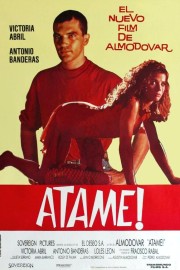Tie Me Up! Tie Me Down!
The first time I watched “Time Me Up! Time Me Down!” was not out of a curiosity towards Pedro Almodovar, but to watch films that had garnered the NC-17 rating. Even then, I can’t imagine thinking this deserved it from the MPAA, but since the film has nudity, even between the one sex scene in the movie, and talk of drug use to go with kidnapping, it makes sense. This movie is all sorts of conflicting, though, and one that definitely requires an open mind, even if you’re an Almodovar fan; he isn’t presenting an easy premise here.
One of the first things that struck me in watching “Tie Me Up! Time Me Down!” this time was that its score was by Ennio Morricone which, had I remembered that, I might have revisited it sooner. As the film progresses, you hear familiar motifs and sounds from Morricone’s score that fit ideally with Almodovar’s blend of dark humor, suspense and humanity. One of the things that makes this film so complicated to really delve into is that it doesn’t feel as natural in its story progression as other Almodovar films, even things like “Live Flesh” and “Bad Education,” which lean into genres and style. I found myself fully engaged with the film, but I just cannot decide if I buy where it ends up. That said, it is clearly the work of its director, though, and that’s always worth celebrating.
“Tie Me Up! Tie Me Down!” begins with Ricky (Antonio Banderas) fixing a door in a mental institution. He is called to the administrator’s office, whom informs him that a judge has deemed him to be of good health, and capable of living within regular society again. The administrator will miss him, and gives him some money for some paintings he drew and other things. One thing we never really seem to get a grasp on in the film is why Ricky was in a mental institution, although we’ll certainly receive hints of his unhinged mind. When he leaves, he has one thing on his mind- finding Marina Osorio (Victoria Abril), a porn star, and recovering drug addict. She is shooting a horror film with a director in a wheelchair (Francisco Rabal), whom not only wants to show respect to Marina, but also lusts for her. Ricky tracks her down on set, steals some things, and later- when she gets home to her apartment- forces himself in, and kidnaps her. His hope? That he’ll get Marina- with whom he slept with when he escaped from the institution one time- to fall in love with him.
Almodovar’s film seems to hinge on the premise of Stockholm Syndrome, but there’s also hints of “Beauty and the Beast,” as well- not the Disney film, of course (which came out a year later), but Jean Cocteau’s version. What Ricky is doing is wrong, and even he seems to acknowledge it at times, but it’s a means to an end for him. Marina is not a passive victim, however, and that’s an important point. Almodovar has written these two as intelligent adults without burnishing off the rough edges of their characters, and that’s a big reason why the film works as it does. Banderas and Abril are sexy and have chemistry as performers, and they go with the situation, but it’s hard for me to buy that these two have a genuine progression towards the ending this film takes us on, or rather, I cannot believe Marina gets to the place she does. I do think she has sympathy for Ricky after he’s beaten up by someone he’s stolen from earlier in the film, but the idea that she would have a complete 180 by the end of the movie is ludicrous. That said, Almodovar can be as much a student of cinema, offering up critiques of movies, as he is a celebrator of the art form; it’s not unreasonable to think- and it’s probably likely- that he understands the absurdities in this story clearly, and is wanting us to see how crazy such a film is. I wouldn’t mind rewatching it in a few more years to see if I still see it that way.










